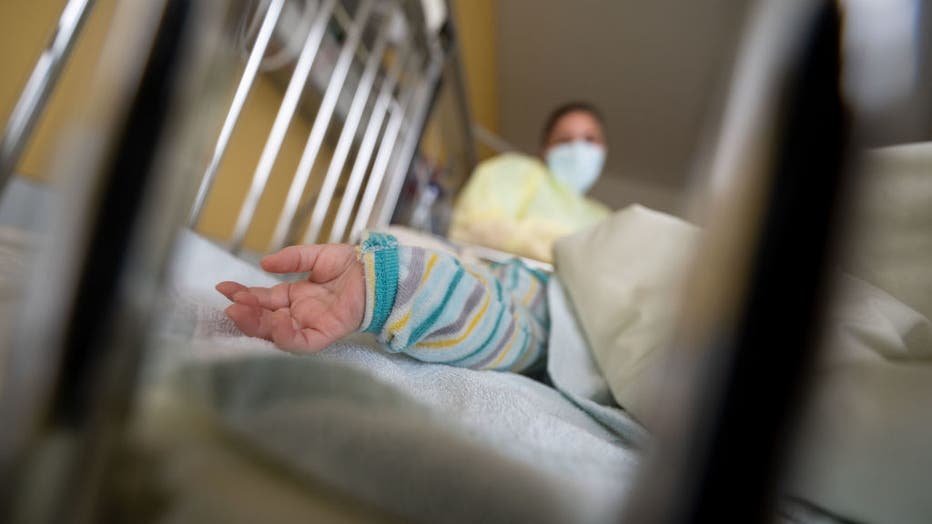Health officials sounding alarm in rising RSV, flu cases in Georgia children

Dr. Neil Winawer on the rising spread of RSV in children
RSV is a common virus that typically caused mild cold-like symptoms, but it can be severe in some cases. This season it's spreading at an unusually high level and overrunning children's hospitals. Emory University's Dr. Neil Winawer sits down with Good Day's Alyse Eady to explain what parents need to know about the virus.
ATLANTA - Children's Healthcare of Atlanta says is sounding the alarm on the number of pediatric cases they are seeing involving the flu and a common respiratory illness that can cause severe breathing problems for little ones.
The metro Atlanta hospital system says its seeing two to three times the number of sick children. Of those, 25% of patients were diagnosed with RSV while 75% tested positive for the flu this week. Last week those numbers were reversed.
These numbers come as the Centers for Disease Control and Prevention reports Georgia is seeing an alarming increasing in flu cases. The Peach State now has the highest level of flu activity in the US, with the virus hitting earlier than it has in years.
Sixty-four percent of the states pediatric in-patient beds are now full.
According to CNN, the hospital has been using surge tents to try to handle overflow in its emergency room for months. Wait times in the emergency department average around three or more hours.
Health officials say it's important for families to get their flu shots as soon as possible.

Georgia reporting highest level of flu activity in US
Doctors are urging patients to get protection with the flu vaccine.
What is RSV?
It stands for respiratory syncytial virus, a common cause of mild cold-like symptoms such as runny nose, cough and fever. Nearly all U.S. children normally catch an RSV infection by age 2.
People infected are usually contagious for three to eight days. Babies and people with weakened immune systems can spread RSV for up to four weeks. There is no vaccine for it, though several candidates are in testing.
Who does RSV affect?
Everyone can get RSV. But it causes the most threat to infants, older adults and other vulnerable people, who can get serious airway and lung infections.
Among U.S. kids under age 5, RSV typically leads to 58,000 hospitalizations and up to 500 deaths in a year.
For adults 65 and older, RSV causes 177,000 hospitalizations and 14,000 deaths yearly.
For babies, the struggle to breathe can interfere with eating. "And that’s really when we start to worry," said Dr. Melanie Kitagawa of Texas Children’s Hospital in Houston, where more than 40 children have RSV.
"They’re breathing fast, breathing deep. We see them using muscles in their chest to help them breathe," Kitagawa said. "These are kids who are having difficulty taking a bottle because their breathing is being impacted and they can’t coordinate both at once."

A patient suffering from respiratory syncytial virus (RS virus or RSV) is lying in a hospital bed in a paediatric ward of the Olgahospital of the Klinkum Stuttgart. (Photo by Marijan Murat/picture alliance via Getty Images)
Why is there an increase in RSV?
The virus is encountering a highly vulnerable population of babies and children who were sheltered from common bugs during the pandemic lockdowns.
Immune systems might not be as prepared to fight the virus after more than two years of masking, which offered protection, according to Dr. Elizabeth Mack of Medical University of South Carolina.
"South Carolina is drowning in RSV," Mack said in a news release. The surge arrived earlier this year than normal, she said.
For babies, their mothers may not have been infected with RSV during pregnancy, which could have given the children some immunity.
U.S. health officials have noted a rise this month in national reports of respiratory illnesses, which they say is at least partly due to the early spread of flu in much of the South.
Last week, more than 7,000 tests came back positive for RSV, according to CDC figures. That’s more than in previous surges.
Is there a treatment for RSV?
There’s no specific treatment, so it’s a matter of managing symptoms and letting the virus run its course. Doctors may prescribe oral steroids or an inhaler to make breathing easier.
In serious cases, patients in the hospital may get oxygen, a breathing tube or a ventilator.
The Associated Press contributed to this report.

